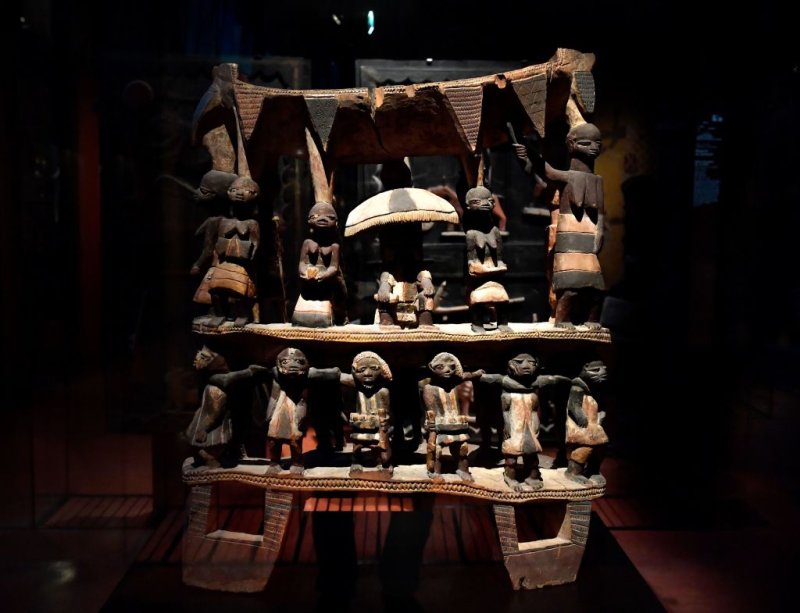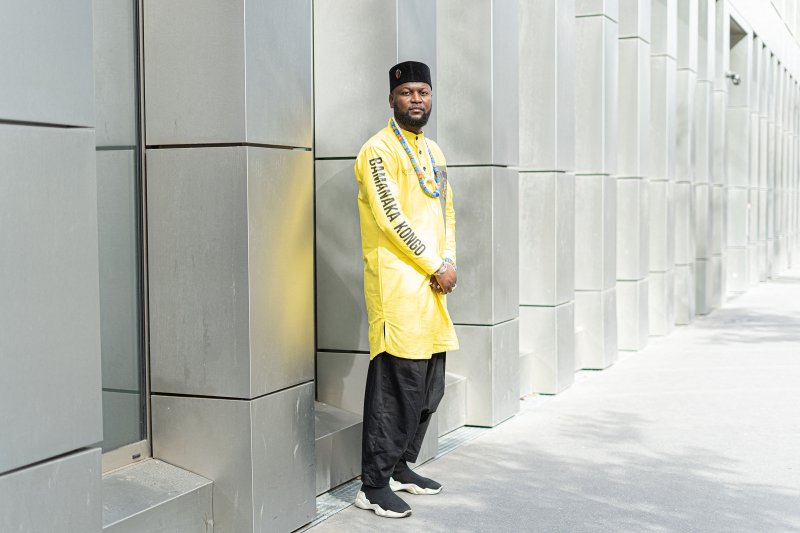Four Activists Have Been Fined for Trying to Remove an Artifact From a French Museum. They Still Say the Object Belongs in Africa
 |
| Royal Seat of the Kingdom of Dahomey from the early 19th century, at the Quai Branly museum in Paris, on June 18, 2018. Gerard Julien—AFP via Getty Images |
OCTOBER 14, 2020 4:17 PM EDT
AParis court on Wednesday sentenced four African activists with fines ranging from €250 to €1000—up to roughly $1,175—for “aggravated theft” after they were convicted of trying to remove an African artifact from display at a Paris museum in June.
While they avoided a potential prison sentence and hefty fine, Congolese activist Mwazulu Diyabanza, 41, and other activists from the pan-African group Unity, Dignity and Courage, say that their action at the Musée du Quai Branly-Jacques Chirac was not an attempt at theft. Rather, in their view, it was an act of “active diplomacy” by a group that believes “African wealth should return to and belong to Africans.”
Diyabanza, who received the suspended fine of €1000, says he plans to appeal the sentence. The ruling comes amid broader debate about the restitution and repatriation of African objects—many of which were stolen during colonial-era expeditions—from European museums back to their sites of origin. The presiding judge overseeing the case told the court on Sept. 30 that observers were witnessing two simultaneous trials: one judging the activists, and “another trial, that of the history of Europe, of France with Africa, the trial of colonialism, the trial of the misappropriation of the cultural heritage of nations.”
Here’s what to know about the case.
What happened at the Quai Branly museum in June?
On June 12, Diyabanza and four other activists, three men and one woman, filmed themselves removing a 19th century funeral pole, which came from modern-day Chad, from its display stand at the Quai Branly, a museum in Paris that is home to art and artifacts from Indigenous cultures around the world. “We’re taking it home,” they declared as they carried it through the museum. Security guards stopped the activists and they were immediately arrested, while the staff was returned to its original position. Diyabanza and his four associates were initially charged with attempted theft of a registered artwork, and risked up to 10 years in prison and €150,000 ($176,322) in fines. Diyabanza later said “We had no intention of stealing this work, but we will continue as long as the injustice of pillaging Africa has not been remedied.”
In an email to TIME, writing in French, Diyabanza calls the action at Quai Branly a way to “place the best interests of our people above all prohibitions and limitations, but also over all protocol and security requirements as well as intimidation.”
After his arrest in June, Diyabanza sued the French state for “theft and receiving stolen goods” with regards to its role in looting objects during the colonial era. He is also facing a separate trial in Marseille in November, and another in the Netherlands in January. The Quai Branly did not respond to TIME’s request for comment on the case.
 |
| Congolese activist Mwazulu Diyabanza in Paris on Oct. 3, 2020. Bardos Florent—Abaca/Sipa USA |
Who is Unity, Dignity and Courage and what do they want?
Diyabanza says the activist group Unity, Dignity and Courage (UDC) “advocates for the liberation of our motherland Africa from all forms of domination and for the freedom of our people in the homeland and in the diaspora.” Diyabanza sees restitution as a form of reparations, and the group also advocates for pan-African unity. Following the incident at the Quai Branly, Diyabanza and other activists from UDC also staged similar protests attempting to remove objects from African art museums in Marseille, France, and in Berg en Dal in the Netherlands, live-streaming their actions on social media.
“What drives us to act is our legitimate right to have access to our cultural heritage and to the recovery of our history,” Diyabanza says. “We will continue to act as we have done in all museums to this day, since we are within our rights.”
During the Paris trial, tensions ran high in the courtroom, as activists shouted at police officers who were blocking off the entrance to the venue. Among the other four other defendants alongside Diyabanza were activists hailing from the Central African Republic, the Republic of Congo and Reunion Island, a French overseas department in the Indian Ocean. According to the New York Times, Julie Djaka, a 34-year-old defendant, told the judge: “For you, these are works. For us, these are entities, ritual objects that maintained the order at home, in our villages in Africa, that enabled us to do justice.” Although five people, including Diyabanza, were involved in the protest, four were convicted and fined on Wednesday. A fifth was cleared of charges.
Why is this case significant in France and beyond?
Debates over restitution and repatriation are nothing new in Europe, as institutions like museums have faced scrutiny over their displays of artifacts from other countries—especially from regions that were once held as colonies by European powers. Because many of the artifacts were seized during violent expeditions or conflicts, many activists and others believe those objects should be returned to their homelands; some European museum leaders say there are questions to consider about the political context and timelines of returns.
But those debates have intensified in recent years. In 2017, French President Emmanuel Macron commissioned Senegalese economist Felwine Sarr and French art historian Bénédicte Savoy to investigate the question of repatriation, specifically in the French context. Their groundbreaking report, published in 2018, called for French museums to permanently return an estimated 90,000 sub-Saharan African artifacts, if the country of origin asks for them. The report also suggested a procedure for their return. When the report was published, Macron promised to return 26 objects that were looted from the West African nation of Benin during a violent 19th century colonial siege—and which are currently held at the Quai Branly—but no items have yet been returned permanently. In an interview with TIME on Wednesday, Savoy said that the fact that the fine was much less severe than it could have been was “symbolic,” and the court’s verdict recognized “the political weight of the action.”
In 2020, a year when legacies of colonialism became flashpoints in the Black Lives Matter movement across Europe, the Quai Branly was not the only site of protest for restitution.
Over the summer, several statues commemorating slave traders and imperialists were defaced or torn down by protests. And even before the wave of protests, an incident at the Museum of London Docklands on Jan. 29 saw a member of the public topple African objects in the museum and shout at members of staff. Isaiah Ogundele was convicted in absentia on charges related to “threatening, abusive, insulting words, or behavior with intent to cause harassment, alarm, or distress.” The Museum said in a statement to TIME that four objects, all on long-term loan from the British Museum, had been removed from display following the incident for conservation efforts: two replicas of the cast of a head of an Ife Man (1300-1400) and the cast of the head of an Ife King (1100-1300) alongside a Benin water container (1500s) and a Benin brass plaque (1500s-1600s).
The verdict faced criticism from campaigners, including Onyekachi Wambu, the director of U.K.-based African Foundation for Development, whose recent Return of the Icons campaign and report is part of a $15 million initiative funded by the Open Society Foundation to restore cultural heritage to the African continent. Wambu started a petition in solidarity with Ogundele, writing that “attempts to criminalise those participating in these campaigns should be avoided at all costs, not least when we consider the initial violent and murderous circumstances in which these collections were acquired. Criminalising the descendants of those original victims intensifies the original crimes.”
As for the 26 objects from Benin that were part of Macron’s original promise, on Oct. 7 France’s National Assembly unanimously passed a bill to return them, as well as a sword and scabbard thought to have once belonged to 19th-century West African political leader El Hadj Omar Tall, which is currently on long-term loan in Senegal. If passed by the French Senate, the law would require the objects to be returned to their sites of origin within one year. But critics, including Diyabanza’s UDC group, have said that the French government and institutions are still dragging their feet on the process. “The French state is resistant to any change in its colonial, imperialist and repressive policies,” says Diyabanza. “We want restitution now, and unconditionally! Everything else is just a delaying tactic.”
The evening before the verdict, Diyabanza told TIME that whatever the result, at least it will acknowledge the group’s actions. And, he promised, UDC will use the news to launch a further campaign for the restitution of their heritage.
“In the case of a conviction, we will be among the martyrs for freedom and dignity who have paid the price for humanity’s progress, while in the case of an acquittal, we will be considered avant-garde pioneers in this honorable fight for the unconditional restitution of our heritage,” he said. “You don’t ask a thief for permission to take back what he stole.”
— With reporting by Maïa Booker
1 comment:
https://www.themoscowtimes.com/2020/10/16/the-with-by-from-per-about-preposition-a71773
The With, By, From, Per, About Preposition
THE WORD'S WORTH Episode 139
Post a Comment